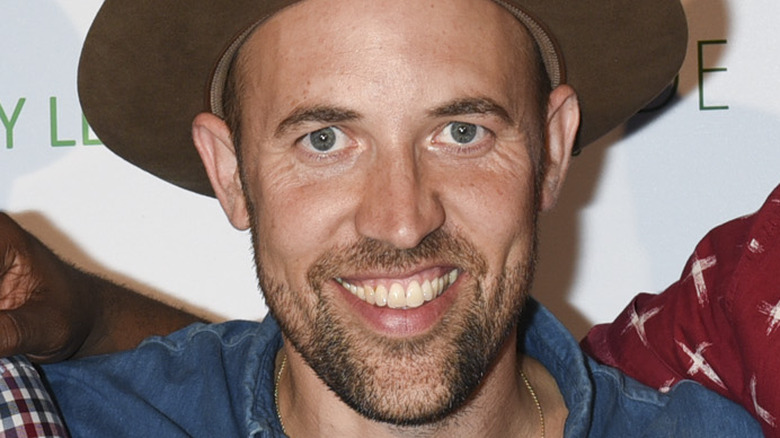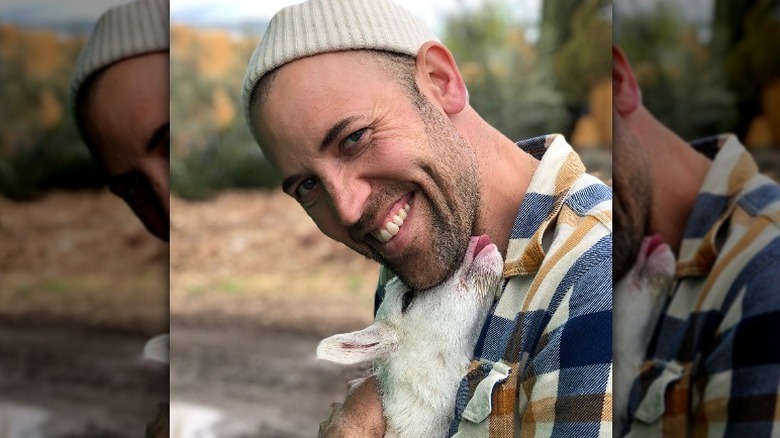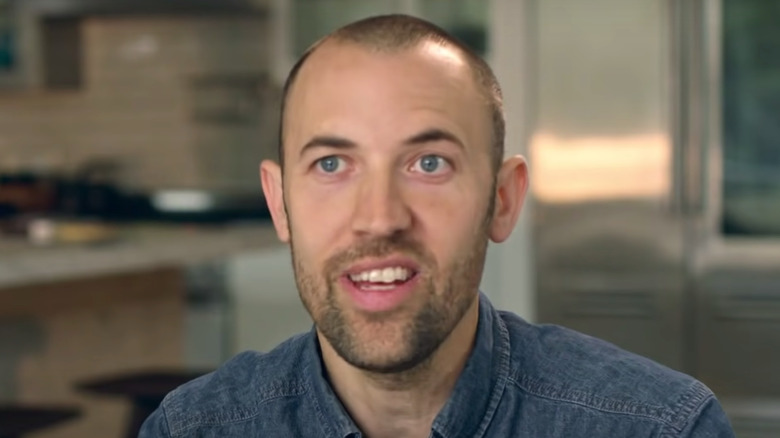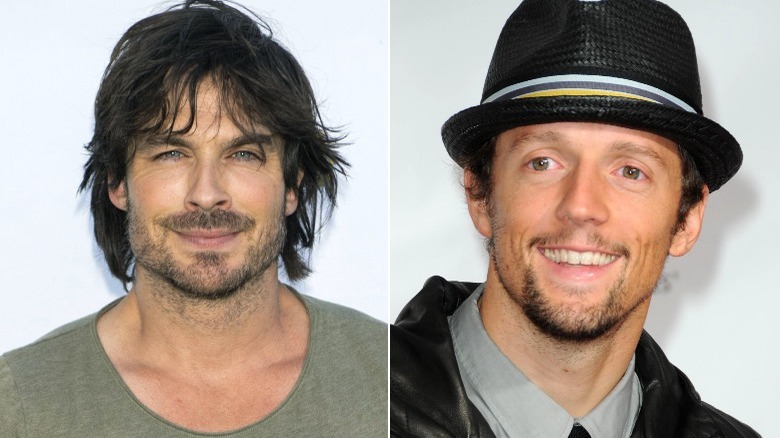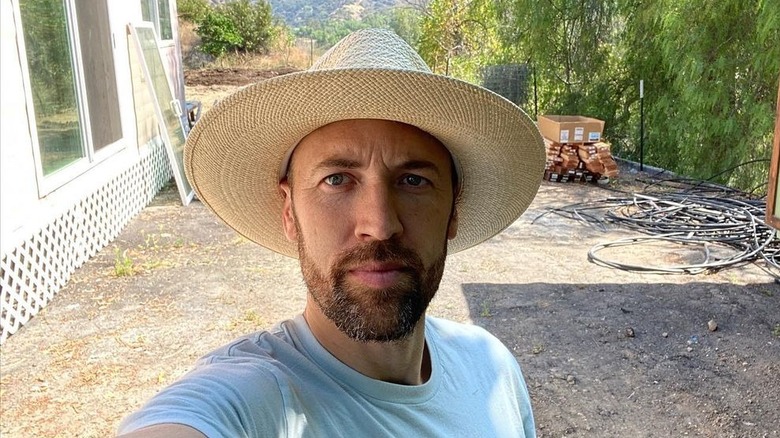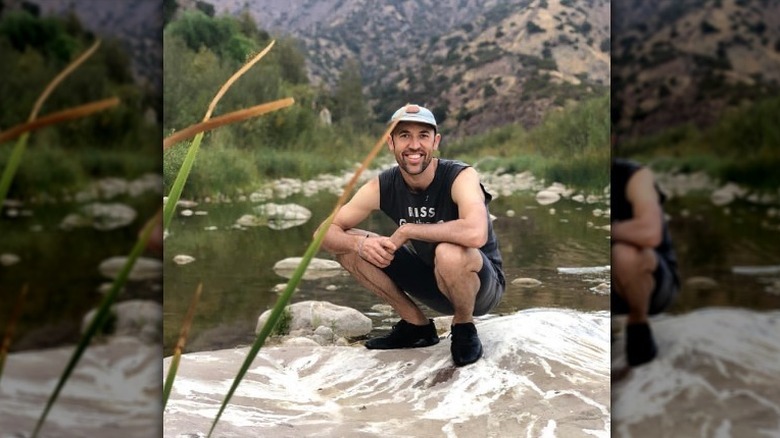Ryland Engelhart Talks Kiss The Ground And Woody Harrelson - Exclusive Interview
Why does Woody Harrelson spend an hour and a half talking about dirt in Netflix's "Kiss the Ground"? Good question. The "Zombieland" actor serves as the narrator for the revolutionary documentary, which seeks to educate viewers about the regenerative agriculture movement — and it all comes down to soil. Through the healing power of soil, there's a viable way to pull carbon out of the atmosphere and heal our earth, which could "balance our climate, replenish our vast water supplies, and feed the world." It's a weighty topic, but thankfully Harrelson and filmmakers Joshua Tickell and Rebecca Harrell Tickell have found a way to explain the science behind the movement in a digestible way, inspiring viewers to take saving the world into their own hands.
However, none of it would exist without Ryland Engelhart, who served as a producer on "Kiss the Ground" and is the co-founder and executive director of the non-profit organization of the same name. He spoke with The List about his passion for sustainability, how the film is making real change across the globe, the future of the regenerative movement, and how he rounded up the documentary's cast of A-list stars, including Harrelson, Ian Somerhalder (who's also an executive producer), and Jason Mraz, whose music scores the triumphant finale. And Engelhart's vivaciousness and passion for the work shone through with every sentence.
Sustainability has always been close to Ryland Engelhart's heart
"Kiss the Ground" is an extremely vital documentary for the times. When did you decide to get involved with addressing the climate crisis and what was your "in" to this topic?
I've been in the hospitality and restaurant business for the last 15 years. My family and I created a restaurant company called Café Gratitude and Gracias Madre, and so I've always been kind of an observer and kind of on the pulse of the sustainability, environmentally-friendly lifestyle. And I also produced a film called "May I Be Frank," which is about the transformation of a guy, who's kind of fat, sick, and nearly dead and comes into Café Gratitude and transforms his life to be healthy and well and [lost] a lot of weight.
So I actually went to New Zealand about nine years ago with him to give a talk at a conference. And it was at that conference that I heard a presentation [about the] idea of how soil and trees and grasses could be this mechanism to pull carbon out of the atmosphere, and by doing so, they could actually heal our soils and make our agriculture and our food more nutritious. And I just had this very life-transformative moment where I saw for the first time a pathway forward of how life could be better in seven generations versus explicitly much worse.
And so it struck me as such a powerful narrative and possibility that I just found myself, everywhere I went, [becoming] an evangelist for soil, and that turned into me starting a nonprofit in my living room with some friends, then to my garage. And now, we've become an internationally recognized nonprofit organization that was the co-producer on the "Kiss the Ground" film, along with two amazing filmmakers named Josh and Rebecca Tickell, [whose house] I actually moved into ... in Venice. And when they were moving out, I was evangelizing about soil and they were saying, "Oh no, we make films about alternative energy. Soil's very boring. I don't think anyone will ever want to watch a film about soil." And then they ended up coming back to me about six months later, as they had heard I was building the nonprofit, loved the name "Kiss the Ground," and so they said we would love to collaborate and make a film together.
And they were like, all right, "Soil's a story!" It really is the story. I think they did a great job summing up such a weighty and scientific topic. And I'm sure communication is something you've had to work through a lot running the nonprofit. What would you say is the most important takeaway from the documentary in these kind of non-scientific terms?
I'd say that the biggest takeaway is that there's a path forward. There's a way. Nature is on our side, that if we can work with nature, we can preserve not only the planet, but we can preserve life for human beings. We've obviously heard the planet's going to be okay. We just might make it an unlivable planet for human beings. So, I'd say that the big takeaway really is that we can take the problem of too much carbon in our atmosphere and turn it into a solution into our soils, and everyone that eats can participate in that revolution. And that it's really one of the most exciting movements because it's for something versus most movements are against something.
It kind of follows the Buckminster Fuller theory of change that if we can create a new system that makes the old one obsolete, people will just gravitate towards that. So, the fact that we can create a narrative that agriculture can go from one of the most destructive systems on the planet to the system that can be the great redeemer is pretty hopeful, compelling, and I think everyone can get on board.
Kiss the Ground is creating real change in the regenerative movement
So, the documentary has been out for a year now. What has the reaction been to it and have you been surprised at all by the feedback?
I would say it's been lightning in a bottle. We've been working on it for seven years and we tried to come out with it three years in a row. We tried to get it into Sundance. We ended up getting into Tribeca. Then Tribeca got canceled because of COVID.
But really, the fact that people were sequestered at home to learn about sequestering carbon into our soils, it was a silver lining of COVID. People were watching more Netflix, people needed a hopeful message. ... There was this awareness that nature was regenerating because people were sequestered in their homes. So, really, the feedback is that it's being seen and used as the anchor communication tool for regenerative agriculture all around the world. We've had about 5 million views on the film.
We've won over 50 film festivals, and it's being translated in 26 languages, 40 countries ... Prince Charles, Prince of Wales, called Gabe Brown, who's the farmer from North Dakota [in the film]. So the fact that this humble farmer, salt-of-the-earth guy is getting a call from the Prince of Wales, it just shows the scope and reach ... The film has been seen by the Secretary of Agriculture [for] the Biden administration, which has allowed for us to have three or four meetings with certain members of his cabinet to recommend and suggest potential pathways of agriculture in America. It's allowed us [to attend] the first meeting of the House of Agriculture committee [where] the "Kiss the Ground" trailer [was featured], and Gabe Brown [was able to] testify to lawmakers about how agriculture could be a solution or beneficial [to stop] climate [change].
It's remarkable all the layers that it's been impacting, but I would say even at a more personal [level], I'll give two other anecdotes. One is that there's a lot of families who have had children who have gone into the kind of permaculture, agriculture space, and their family was disappointed by their choice in life. The film has brought those families together because it has the family go, "Wow. My kids are actually doing something that's really cool, meaningful, and purposeful, whereas I didn't really get it before." So that's been kind of at a human level.
And then, just the power of film. I heard from Ray Archuleta, who's one of the farmers and educators in the film, who said he got a call from an Australian rancher who's managing 7,000 acres of land. He said, "I saw the film and we're completely changing the direction of how we're managing our farm. I get it. That was the straw that broke the camel's back." So, as far as another high-level kind of statistic ... Gabe Brown and Ray Archuleta have a company called Understanding Ag that consults farmers and ranchers on how to transition to regenerative agriculture. And they're now managing 22 million acres of land through the people that they're consulting to. So just the scale of them becoming world experts and then them being able to deploy their expertise and consultancy on large swaths of land could have never happened so quickly without such a powerful communication tool.
Ian Somerhalder, Woody Harrelson, and Jason Mraz were all on board with the mission
There's also a lot of big names in the documentary as well like Ian Somerhalder, Patricia Arquette, and Woody Harrelson. Were you part of those conversations to bring them on board or were those things that they were also passionate about?
I would say that my greatest superpower is building community and human relationships, and as somebody who's into hospitality and running restaurants in Los Angeles, I've been able to schmooze and connect [with] so many amazing people running a plant-based organic restaurant. I've been able to make so many amazing relationships with so many different kinds of people. Some being based on the nature of being in Hollywood, being folks who are inspired by Café Gratitude, inspired by plant-based food, inspired by environmentalism. I remember I did a campaign to get no GMOs to be able to be grown in LA County five years ago. We did a petition out of our restaurants, and Ian Somerhalder — before I'd even met him — he took one, signed it, put it up on his social media, and broadcasted it out to his millions of followers. This is maybe three or four years before I met him.
And then I met him at the restaurant a couple years later. And again, [we] just had a total mind-meld of passion for the environment. He told me that he had gone to Africa with Allan Savory and that he had wanted to make a film about this, but just got bogged down by all the thousand things that he got bogged down with. And so we'd ended up taking that film that he wanted to make [and putting it into "Kiss the Ground"]. And that was his sequence, that was probably seven or eight-year-old footage integrated into this film because [the other] film that he wanted to make independently wasn't able to happen, but he was able to integrate that footage into our film and then became an executive producer and participated.
With Woody Harrelson, he's been a family friend for over 20 years. My mom hosted his wedding ... And I think the big deal there was like, when I first asked him to do it, he's been a very, very strict vegan and pretty staunch about that message. And so there was a little bit of fear that he was going to reject this message because it wasn't the pro-vegan dogma. Even though it was pro-earth and pro-healing and regeneration, there was kind of a distinction that, "No, animals are important in restoring land." And so there became this little bit of fear and conflict and he was a little bit apprehensive at first, but he read the script [and saw] what the film communicated. He said, "Yes," and we actually recorded three different VOs to actually get the right one. That was that relationship.
Jason Mraz ... He's been an investor and supporter of Café Gratitude since the beginning. And when we first launched our first piece of media with "Kiss the Ground" some seven years ago called "The Soil Story," he was one of our ambassadors [in bringing] it out to the masses. I think, again, my gift is probably in the gift of enrolling people, getting them inspired about something and wanting to participate. And because I have such a positive, infectious energy about the things that I get excited about.
Yeah.
And so I think that was a big part of the engagement and ... I think that people saw that there was no ulterior motive. This was truly a message for the betterment of all people and for the earth, and people could see that and feel that in earnest. And I think also in the same way that I went from a little bit apathetic and defeated and not really seeing a way that life could get better on planet earth, I think the same thing for those individuals who are like, "Oh my God, I have all this power and influence. And I feel also powerless. I can't do anything." So to be able to lend their platform and celebrity to such a potent, inspiring, and even kind of not-new message, but relatively unknown in the general awareness space, that there's a way that we can balance our climate, that we can reduce the amount of carbon or atmosphere through something as natural as our agriculture and our land management.
We've always known that trees could do that, but we never really understood that soil and grass, as in agriculture, could also be the biggest opportunity as a carbon sink.
The regenerative movement does not stop with Kiss the Ground
And it affects us everywhere — whether you're in LA or Beverly Hills, or if you're overseas. I also wanted to ask, you talked a little bit about some of the things you guys have been doing as of late. But do you have any next big plans or steps for the documentary or the non-profit?
Yeah. So Josh and Rebecca, the filmmakers, they're making a sequel and a trilogy.
Oh, wow.
So there's two more films in the works. The title of the next one is called "Common Ground."
Okay. There we go.
So that's very, very exciting. And so that's kind of there and I'm not playing a direct producer role, but they're dear friends and we're sending lots of recommendations for who should be in the film to them. What we're doing as the organization next is we're focusing on a campaign called Regenerate America. Soil is our common ground, and it's a grassroots coalition-based campaign to have an unprecedented amount of support to reform the 2023 Farm Bill.
The Farm Bill is the largest bundle of taxpayer dollars in one bundle that affects our agricultural policy. It's about $480 billion. And most people don't really know what it does or its function. And so we're going to do our best to bring a lot of awareness about the Farm Bill [and] that regenerative agriculture is possible in our future. It could improve our human health inside of a pandemic. We're in a pandemic of the sick and the [immunocompromised], and we're also in a moment of observing the most unstable weather, record droughts, fires, floods, all these symptoms of an unstable climate. And so there's never been a [better] moment to really have people be so engaged [and] feeling the reality of climate ... So, working off the momentum of the film [and] the awareness of those 5 million people, how do we continue to build that awareness into a collective voice that leads to political will?
It's kind of a public-facing campaign with PSAs and many organizations and celebrity [and] influencer ambassadorship, as well as working directly with lawmakers to do farm tours where they could have a transformational moment of being on a farm and being at a fence line and seeing a regenerative system and a degenerative system, and really having that individual transformation for that lawmaker. ... We know political systems, there's a lot of influence and potential corruption. We also know that there's people that are in those systems and those people could be transformed in their hearts and minds if the right conversation and the right information was presented. So, we're in the early phases of that. That's going to go live potentially February or March in 2022, leading all the way to the 2023 Farm Bill.
As far as how individuals can get involved, we have a program called the Soil Advocacy Training, similar to Al Gore's climate reality training. We're building a movement of regenerators, people who are inspired about regeneration, regenerative agriculture, and the regenerative movement. So, we have a training program called SAT — or Soil Advocacy Training — and we've trained over 3,300 people in 26 countries around the world. So [you can] take one of our soil advocacy trainings ... as an online self-paced course, or you can do it as a live cohort.
And then we have another couple courses. If you wanted to take regenerative agriculture into your backyard, or even into your window sill garden, ... how could you do that on a small scale to be part of the solution? We have some courses online called Regenerative Gardening for Beginners and for Advanced students.
The one last thing is, obviously, people are like, well, how do we support farmers in making this transition right now? So our fourth program is our Farmland Program, which provides scholarships to farmers and ranchers who want to make the transition and can't necessarily afford the education to do that. And ... I think we have a hundred scholarships that are up right now available for farmers to get access to world-class regenerative, agricultural education. So we're providing those scholarships for farmers. And then we're also allowing farmers who have projects that they need a microgrant for to apply to Kiss the Ground and we can provide them funding for a microgrant to improve their infrastructure. So if anyone wants to support Kiss the Ground and support farmers in their transition, you can support our work because we are a 501(c)(3) nonprofit [and] survive off of the support of our contributors.
Ryland Engelhart wants to leave the world in a better place for future generations
The movie is all about protecting the earth and making sure we're still around for it. So I wanted to know, what are your favorite things to do in nature? What's keeping you fighting the good fight?
So my favorite things, I planted my garden just last week. I planted a ton of broccoli because my son only eats broccoli. We planted a whole bed of broccoli, and he helped me plant them. And so the idea that I'm going to be able to plant a garden bed of broccoli with my son and then for him to have that be his favorite vegetable, [it's] pretty, pretty exciting and inspiring. And then, since I moved to a farm called Sow a Heart Farm in Southern California, just north of LA, we have a CSA program where we provide farm boxes of regenerative agriculture-produced produce mostly grown on this farm that anyone in LA can order ... and they can actually participate in nourishing their bodies, regenerating their bodies, but also regenerating soil and the planet and putting carbon back into the ground. And it's a pretty exciting win-win that people can very tangibly support.
Right. And taste the benefits of it, as well.
That's right.
I think that's about all I had for you, Ryland. Do you have anything to add that I may not have asked?
I would say [to check out] "Kiss the Ground," and then we've created over 60 short films, but there's probably about 10 of them that are like really beautiful, short format, two to five-minute pieces that I'd love for you to kind of share in the show notes to your audience [including] "The Regenerative Secret," "The Biodynamic Film," "The Compost Story," and "The Soil Story." So I'd love people to engage and check those out. And then the last thing is just we have an amazing membership program where you can become a member of Kiss the Ground for as little as 10 bucks a month. You can support this amazing work, and it really is, for me, the most hopeful and inspiring and purposeful work that we can be doing. So I hope people feel that from this talk and interview, and I hope that you join our membership and join the regenerative movement.
"Kiss the Ground" is now streaming on Netflix. For more information on the movement, visit their website.
